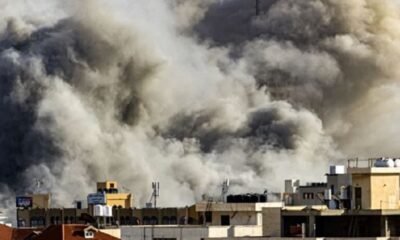Asia
Lebanon mourns after Beirut blast kills 100

Lebanon is in mourning after a huge explosion in the capital Beirut killed at least 100 people and injured more than 4,000 others on Tuesday.
The whole city was shaken by the blast, which began with a fire at the port which exploded into a mushroom cloud.
President Michel Aoun said 2,750 tonnes of ammonium nitrate had been stored unsafely in a warehouse for six years.
“It is a catastrophe, I’ve never seen something like that.”
Lebanon is in a state of emergency following a massive explosion in Beirut that killed at least 100 people and injured thousands.
Follow our LIVE coverage on the #BeirutBlast: https://t.co/8qEDq3qL5R pic.twitter.com/kSrpNt4oGf
— Al Jazeera English (@AJEnglish) August 5, 2020
He scheduled an urgent cabinet meeting for Wednesday, and said a two-week state of emergency should be declared.
The country will observe an official period of mourning for three days from Wednesday.
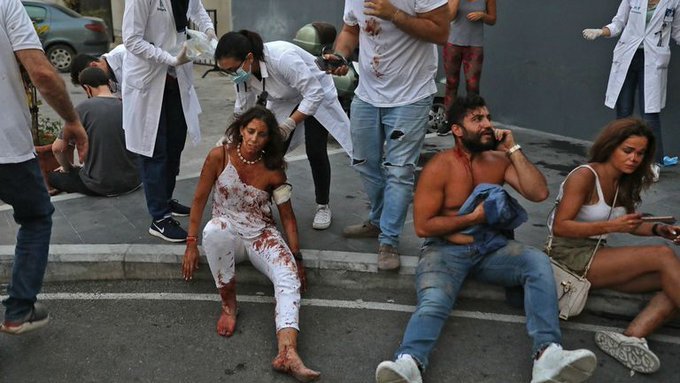
Hospitals are struggling to deal with the Beirut explosion as casualties continue to rise
President Aoun also announced that the government would release 100 billion lira (£50.5m; $66m) of emergency funds.
“What we are witnessing is a huge catastrophe,” the head of Lebanon’s Red Cross George Kettani told local media. “There are victims and casualties everywhere.”
“Over 100 have lost their lives. Our teams are still conducting search and rescue operations in the surrounding areas,” the Lebanese Red Cross added in a statement on Wednesday.
Officials said that an investigation was under way to find the exact trigger for the explosion. Lebanon’s Supreme Defence Council said those responsible would face the “maximum punishment” possible.
The ammonium nitrate had reportedly been unloaded from a ship impounded at the port in 2013, and then stored in a warehouse there.
The explosion comes at a sensitive time for Lebanon, with an economic crisis reigniting old divisions as the country struggles with the coronavirus crisis. Tensions are also high ahead of Friday’s verdict in a trial over the killing of ex-Prime Minister Rafik Hariri in 2005.
What happened?
The explosion occurred just after 18:00 (15:00 GMT) on Tuesday. A BBC journalist at the scene reported dead bodies and severe damage, enough to put the port of Beirut out of action.
Local media showed people trapped beneath rubble. A witness described the explosion as deafening, and video footage showed wrecked cars and blast-damaged buildings.
The explosion blew out windows miles away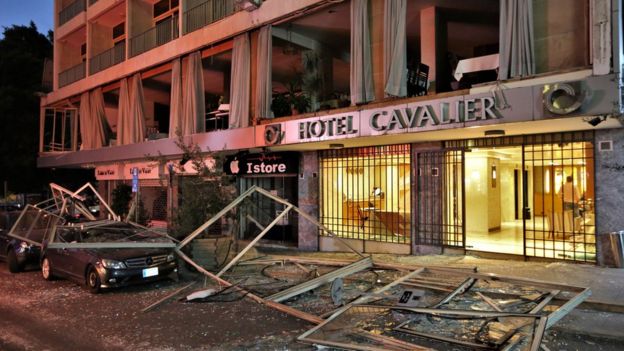
“All the buildings around here have collapsed. I’m walking through glass and debris everywhere, in the dark,” one witness near the port told AFP news agency.
Hospitals were said to be overwhelmed and many buildings were destroyed.
The blast was also felt 240km (150 miles) away on the island of Cyprus in the eastern Mediterranean, with people there saying they thought it was an earthquake.
What is ammonium nitrate?
Ammonium nitrate has a number of different uses, but the two most common are as an agricultural fertiliser and as an explosive.
It is highly explosive when it comes into contact with fire – and when it explodes, ammonium nitrate can release toxic gases including nitrogen oxides and ammonia gas.
An ammonium nitrate explosion can release toxic gases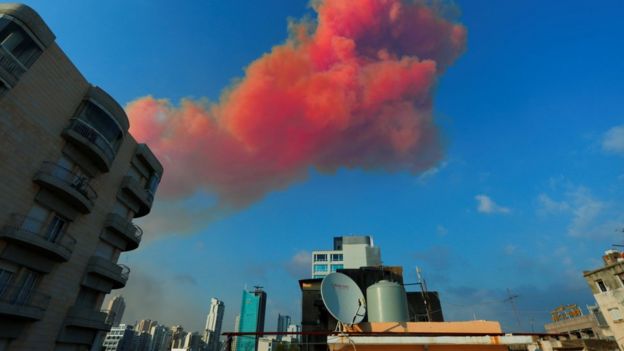
Because it’s so flammable there are strict rules on how to store ammonium nitrate safely – among the requirements are that the storage site needs to be thoroughly fire-proofed, and there can’t be any drains, pipes or other channels in which ammonium nitrate could build up, creating an additional explosion hazard.
What’s the situation in Lebanon?
Lebanon is experiencing political turmoil, with street demonstrations against the government’s handling of the worst economic crisis since the 1975-1990 civil war.
Many blame the ruling elite who have dominated politics for years and amassed their own wealth while failing to carry out the sweeping reforms necessary to solve the country’s problems. People have to deal with daily power cuts, a lack of safe drinking water and limited public healthcare.
The port has been largely destroyed by the blast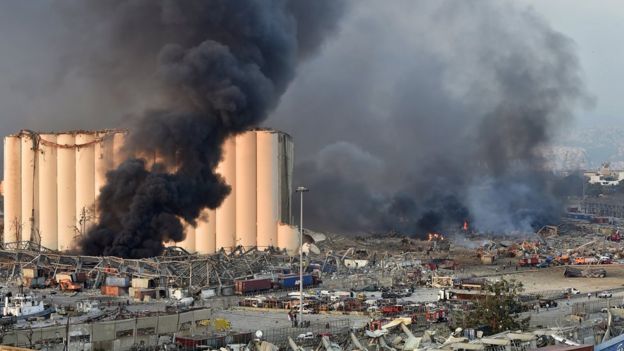
There has also been tension on the border with Israel, which said last week that it had thwarted an attempt by Hezbollah to infiltrate Israeli territory. But a senior Israeli official has told the BBC that “Israel has no connection” to the Beirut blast.
The blast happened close to the scene of the huge car bombing which killed ex-PM Hariri. Tuesday’s blast also came days before the long-awaited verdict in the trial at a special court in the Netherlands of four men accused of orchestrating the attack.








